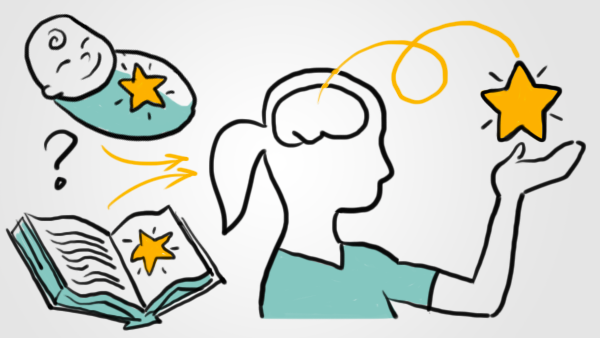Is Creativity a Skill or a Talent?

I once had someone tell me I wasn’t creative enough to work in advertising. This was back in 2013 where I was working my first “real job” just after college in printed advertising. I respected this colleague a lot at the time. She was artistically gifted, and graphic design came to her naturally, which is why her accusation hit me so hard.
She claimed I was analytical and technical, and that I got caught up in processes and orders of operations to truly “be creative”. I argued that I could be those things and still be creative. I wanted to have access to all those tools in my toolbox.
I won’t defend my creativity here. I’ve continued to work and be successful in creative industries long enough that I hope my body of work speaks for itself at this point.
The reason I bring up this story is because the accusation comes down to one argument: is creativity a talent or skill?
To dive a little deeper, I’ll point you to this article published by EdSurge that tackles half of this question and quotes many high profile, creative people who work across different industries. I selected a few quotes to explore more deeply, but I’d recommend checking out the full article later.
Carol Tang, the executive director at the Children’s Creativity Museum in San Francisco says, “Creativity is a set of skills, behaviors, attitudes, and beliefs — more akin to a mindset than a discrete skill. For example, there are specific skills that would encourage creative thinking — both divergent idea generation and convergent selection between ideas. However, without having agency or self-efficacy, you may not apply those skills.”
With this quote, Carol reinforces something I’ve always thought about creativity. If it’s a mindset, it will use a combination of skills like curiosity, empathy, and self-reflection. Creativity is (broadly) having a large enough worldview to not limit your thought process to just one way of doing things. The “creative person” doesn’t think inside the box, but to be able to do that effectively you have to first seek out new ways of doing things.
You then have to realize that other people’s “way of doing things” can effective too. Finally, you have to reflect inward to combine “their way” with “your way” to find something new. Again, this is a broad, general idea I use to jumpstart my own creativity, but if you practice using this mindset in this way, it can work for you too.
Chris Bennett the CEO of Wonderschool says, “There are tactics to be creative and foundational things you can do to develop creativity. It depends on what you want to create. For art: create it, present it, try to sell it, get feedback and repeat. Do this a lot. And the earlier in life the better. Traveling, going outdoors, and having conversations about the things you’re creating can also enhance creativity.”
Here we get some insight into Chris’s process. He first stresses the practice element to creativity. Repeating the process over and over until it feels natural will make it feel like a natural talent. I also like that he specifically mentions getting feedback. Working in creative industries, I have seen people react to criticism with negative feelings like it’s a personal attack on their work. I’d be lying if I said I was immune to these feelings myself, but in those situations, it’s important to take a step back and look at your work objectively. Embracing constructive criticism can only help to elevate your work, and even non-constructive criticism has its place sometimes. I wouldn’t be writing this post hadn’t been for my colleague’s comments back in 2013.
Chris also mentions starting early in life, which is a sentiment echoed in this next quote. Esther Wojcicki, a journalism teacher and author of the book “Moonshots” says, “[Creativity] cannot be taught in a traditional classroom that is focused on doing everything right. It can only be “empowered” when kids are not afraid to take a risk and when they believe in themselves. Children are innately creative, and it is educated out of them.”
I chose to highlight this quote because I think we can all agree that children with their boundless energy and enthusiasm seem to come by creativity easily. After all, what child doesn’t have imaginative and/or unique ways of looking at things? What Esther is saying then is that traditional teaching models stifle that innate ability unless other forms of empowerment cultivate that creative gift. This empowerment ties back to the quote from Carol Tang earlier where she was talking about the “skills, behaviors, attitudes, and beliefs” that complement and build what we consider creative mindsets.
What all three of these people are saying is that we all have the ability to think creatively. It’s just up to us to build back up the confidence and imagination we all had when we were children to unlock it.
So that’s my challenge to you, dear reader.
Don’t let others and especially don’t let yourself tell you that you’re not creative.
Put yourself in new places and situations.
Learn new things and ideas.
Don’t fall into the trap of thinking there’s only one way to solve problems.
Creativity will follow if you let it because it’s not really a skill or a talent.
It’s both.
